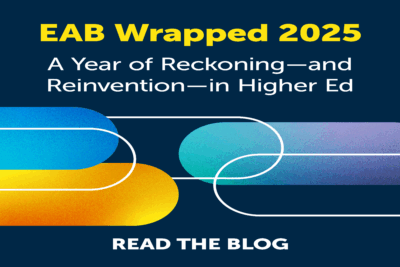Inside our Presidential Experience Lab at OpenAI
As we face unprecedented change in the way higher education is delivered and experienced, those who effectively integrate artificial intelligence (AI) into their institutional strategy, curriculum, and culture stand the best chance of success—for themselves and their job-seeking graduates.
For seven years, we’ve partnered with future-shaping innovators like Zappos, Google, and NVIDIA to host the Presidential Experience Lab. Our June 2025 convening took place at OpenAI’s New York City headquarters. University presidents had the chance to experience what’s new in AI technology, hear what’s coming next, and share with one another what’s happening on campus as we all embrace AI-driven transformation.
Here’s what we learned.
AI is evolving fast and touching every aspect of life
The pace of technological advancement in the AI space is unprecedented—things we either thought were 10+ years away, or couldn’t even imagine, have already become possible. Content generated instantly by AI is reaching a level indistinguishable from human output. Here are just a few examples of the latest in AI that you might have missed:
- AlphaFold2 tackled the long-standing protein-folding problem by predicting 3D protein structures from amino acid sequences, a task that once took decades and now takes seconds.
- A Sydney-based hedge fund startup replaced traditional human analysts with artificial intelligence and outperformed the global stock market in its first six months.
- Spotify is increasingly filled with AI-generated music, raising concerns about authenticity, listener experience, and fairness for human artists.
The best AI training is consistent trial-and-error
Given the pace and complexity of advancement, the “adoption of AI” mindset is a bit of a red herring. Institutions and individuals feel rightly overwhelmed, but the key is to dive in head first—starting now. Spend at least 30 minutes a day or 3-5 hours a week using different AI tools for personal and professional purposes, as opposed to hoping a single ‘training’ will suffice. By the time that training is developed, it will already be out of date. For universities, a “no-penalty-for-failure” policy can help encourage leadership and faculty adoption.
Download Our Infographic for Guidance on Where to Explore AI’s Potential
AI isn’t optional—but how we use it is up to us
It’s important to get beyond “Will we embrace AI or not?” both in the classroom and at the broader institutional level. It’s a bit like asking “Will the internet matter?” back in 1990. The smart move for a leadership team is assembling a working group to ask how your campus can leverage AI to advance its priorities in alignment with core values. Dr. La Jerne Cornish, President of Ithaca College, charged their presidential AI working group to answer these questions:
1. How can AI enhance the student experience?
2. How can AI improve our efficiency and effectiveness?
3. How can AI advance our strategic priorities?
4. What policies do we need around AI?
5. How does AI use align with our core values and mission?
6. What opportunities does AI present for teaching, research, and service?
Employers are looking for AI-competent critical thinkers
Graduates are already entering a job market that’s highly impacted by AI, as companies question the value of early career employees—particularly for rote or repetitive tasks. Higher ed’s job now is to ensure graduates can differentiate themselves by demonstrating critical thinking and other skills that typically come with several years of work experience. Most importantly, new grads must demonstrate to employers that they’re able to effectively use the latest AI tools relevant to their fields.
-
Louisiana State University
Created an honors course that brings real industry challenges to campus so that students can practice AI-based problem solving. Program participants have gone on to work at companies like Microsoft and SpaceX, and the course has since been integrated across more than 40 other classes.
AI is winning on warmth, not just accuracy
AI isn’t just reshaping technical tasks—it’s beginning to outperform humans in domains we once believed were uniquely ours, like empathy, encouragement, and individualized support. In trials of AI chat bots, people often report preferring AI interactions to human ones, even on emotional and interpersonal dimensions.
-
The Khan Academy
Launched Khanmingo, a conversational AI tutor offering personalized, on-demand support built on GPT-4 and Khan Academy content. The chat bot encourages students’ problem solving as they write, code, research, and do math—but will never give answers outright.
Hear why EAB’s Presidential Experience Lab is a can’t-miss event for presidents

More Blogs

EAB Wrapped 2025: A year of reckoning—and reinvention—in higher ed

Fixing What’s Broken in Interdisciplinary Program Design
